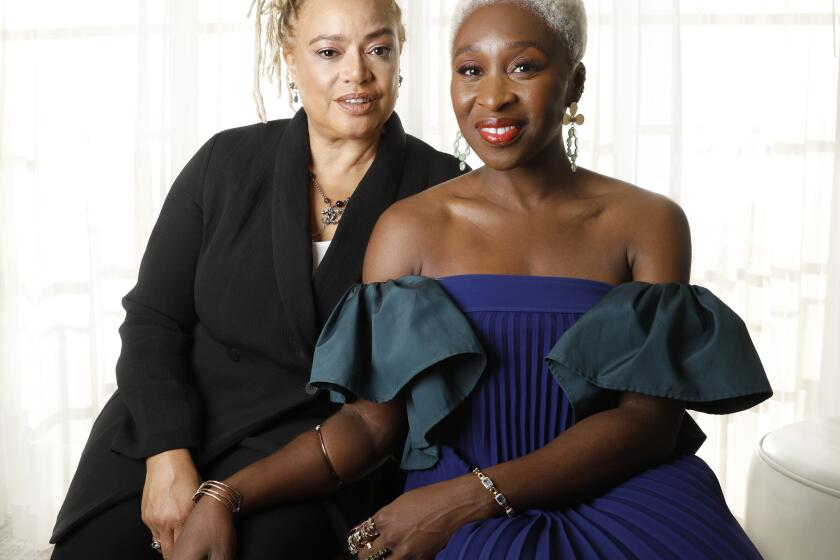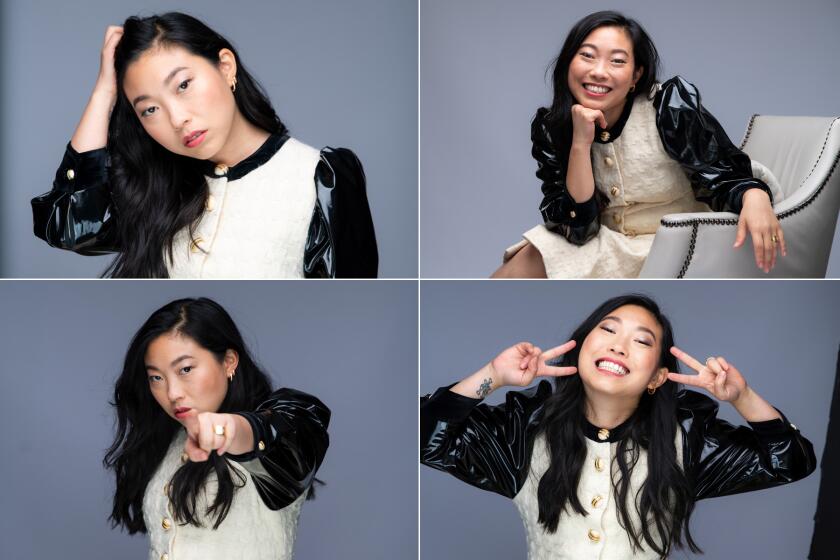Who could give advice to Charlize Theron about being a celebrity? Only Jennifer Lopez
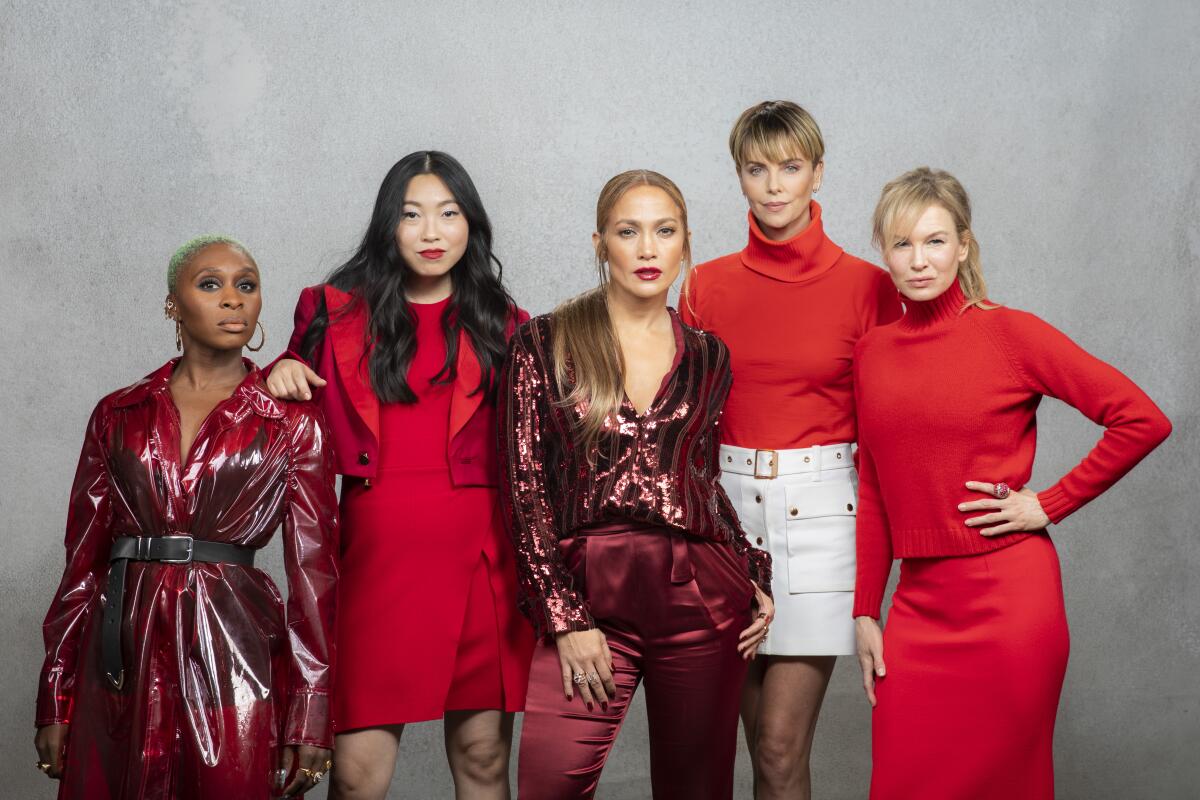
- Share via
Sometimes even celebrities need advice. Even on how to be a celebrity.
So it was recently that Charlize Theron, Renée Zellweger, Cynthia Erivo and Nora Lum — perhaps better known as Awkwafina — recently came to hang on every word as Jennifer Lopez talked about her attitude toward her own fame and celebrity.
“I just try to stay super conscious of the fact that I have a responsibility,” Lopez said. “And it’s not that I don’t have bad days. I’m a human being.”
Zellweger in particular was equally candid about grappling with the demands of being a public person.
“I find that when I focus most of my energy on the people who are closest to me and I spend time nurturing my internal self, my curiosity, learning, growing, becoming a better person, that I do a better job of it when I keep it small,” Zellweger said. “I’m a better daughter. I’m a better friend. I’m a better actress. I think I’m a better human being.

“Because I’ve gotten caught up trying to run a race that doesn’t belong to me,” Zellweger added. “I’ve seen what that looks like and it doesn’t suit me.”
There was an air of genuine curiosity and exchange as the five women gathered together for a roundtable conversation. The celebrated roles that brought them together — Lopez as a stripper-turned-criminal in “Hustlers,” Theron as newscaster Megyn Kelly in “Bombshell,” Zellweger as entertainer Judy Garland in “Judy,” Erivo as slave-turned-abolitionist Harriet Tubman in “Harriet” and Lum as a young woman grappling with family and cross-cultural identity in “The Farewell” — were just conversation starters as the talk veered toward telling stories without judgment, overcoming great odds and the rigors of pole-dancing.
Jennifer, your pole-dancing in “Hustlers” is astonishing. Was it just difficult athletically?

Lopez: I mean, it was a lot of things. It was very challenging, physically it was very acrobatic. And that was new for me. And I think people think, “Oh, she’s a dancer, so that’ll be an easy thing to do.” It wasn’t, it was really difficult. And definitely what I love about doing movies is that you get to do these things that you would not normally do, you learn all these different skills. In the beginning, I was like, “Oh yeah, I’m going to learn how to pole dance and it’s going to be so sexy and it’s going to be amazing.” And then I was like, “This [stuff] is hard and I’m in pain. It’s not fun.”
Renee, you studied Judy Garland intensely in preparing for “Judy.” Was some of that just learning how she looked, how she moved, or what did you hope to get from that?
Zellweger: Well, a better understanding about the circumstances of her life that she was grappling with and her final chapter. It didn’t make sense to me. I didn’t know a lot about what she was experiencing at that time in her life. And I felt like a lot that was written about her sort of blanketed that final chapter in tragedy in some way. And I just wanted to understand it better and more deeply. We dug in. I say “we” because it was this shared collaboration with everybody for like a year before we started to conjure her essence.

And to advocate for her in some way, because when you come to understand how she ends up, having financial hardships and some of the health issues that she was struggling with, you empathize with her but it also shifts the perspective. I don’t think that she was tragic or a victim, but she was really heroic that she could carry on and continue to perform at this high level for as long as she did. She’s for the ages.
Nora, in “The Farewell” your character Billi is derived from director Lulu Wang’s real-life story. So having her right there as you’re sort of channeling her, what was that like?
Lum: I knew that the character was based on Lulu but the cool thing is she wasn’t very stuck on, “This is me.” She wanted to share the character. When you have that level of trust, it’s good because we built it together. And at the end of the day, Billi really symbolizes the specific experience rather than [being] based on one specific person.

Awkwafina on finding the drama within herself.
Charlize, you’ve said that this transformation of playing Megyn Kelly was more difficult than becoming Aileen Wuornos for “Monster.” Can you talk more about that?
Theron: God, context, I’ve got to watch myself. I said that in jest because there was a funny moment where somebody had brought that up at a Q&A and I was trying to be funny and now I’ve got to fix this story.
Listen, you can’t say something like that because every experience and every person or character that you play is just so different and to even say that one’s harder than the other is just completely stupid. And I’m gonna start censoring myself. But I will say this. It was harder in the sense that Megyn is incredibly well known and Aileen really wasn’t. And I feel like Aileen was a discovery for people, like they would see that movie and then they would Google search her, see the Nick Broomfield documentaries. And so it was like a later discovery, which allows you a little bit of breathing room as an actor because your audience is gonna go in not necessarily knowing so much.

Charlize Theron on the mega-makeup it took to play Megyn Kelly.
With Megyn, I knew I had none of that because she’s just so known and her voice is so specific. And we all know that persona, how she carries herself. That was harder in the sense that I felt that pressure of like, “Oh, I don’t feel like there’s any wiggle room here.”
Cynthia, in many schools here in America, we only learn the bare essence of Harriet Tubman’s life, if even that much. As a British person, what did you know of her before the project came to you?
Erivo: I was lucky that in my school we actually learned about her. So I knew what she did. I knew that she had taken the run for 100 miles to freedom. I knew that she had come back again and again and again. I just didn’t know the details of her. And I think this experience was so cool because we were able to fill in the blanks. I was thinking of it like painting by numbers. You see the picture but there are no colors. But then we could fill in all the colors, giving people the detail of just small things to make her real. This gave her her humanity, her womanhood back, because that’s what she was, first and foremost, a human and a woman.
“Harriet” star Cynthia Erivo and filmmaker Kasi Lemmons talk about how their Harriet Tubman movie bucks a system that still hesitates to build a project around a black female protagonist, and they detail the physical and emotional cost of making their biopic.
Jennifer, how did you decide to do the upcoming Super Bowl halftime show with Shakira? It’s a hot-button topic, as some performers have said they wouldn’t do it. How did you come to that decision for yourself?
Lopez: I think it’s super important for two Latina women to be headlining the Super Bowl, especially right now in Trump’s America. So for me, it was something that I was excited to do.
Theron: Do you get nervous?
Lopez: Sure. Absolutely. But here’s how I get nervous. And I think maybe you guys, because you’re all performers, feel this. It’s like you get that nervous energy and it’s just you’re used to it. Like I’m used to feeling a little bit of nervous energy and butterflies and everything before I’m getting ready. And a minute or two before, right when I’m about to go out and everybody’s rolling and I’m staring at the crowd and they can’t see me, it just goes real quiet. And something drops into my body where calm is your superpower. And then you’re in control. But absolutely I feel nervous and excited and butterflies and my heart beating out of my chest, all of those things. But in the fun way, not in the debilitating way.
Jennifer, you’re a producer on “Hustlers,” and Charlize, you’re a producer on “Bombshell.” Is there something about a specific project that makes you want to take that extra step and be more in control of the project?
Theron: I have produced most of the stuff that I’ve done probably in the last decade. I have to love it because it’s a year, if not more, of your life where you’re needed and you have to see it through all the way. And it’s very time-consuming, so I try to do things that I know are subject matters that I want to stay engaged with for however long it’s going to take to make. And that I know I’m going to be continuously interested in and excited by and want to sit in an editing room day after day and figure it out and fight for it. I mean, we finished “Bombshell” and last week we were still trying to figure stuff out. When you are producing something and you love it and you want to see it all the way through, it never stops.
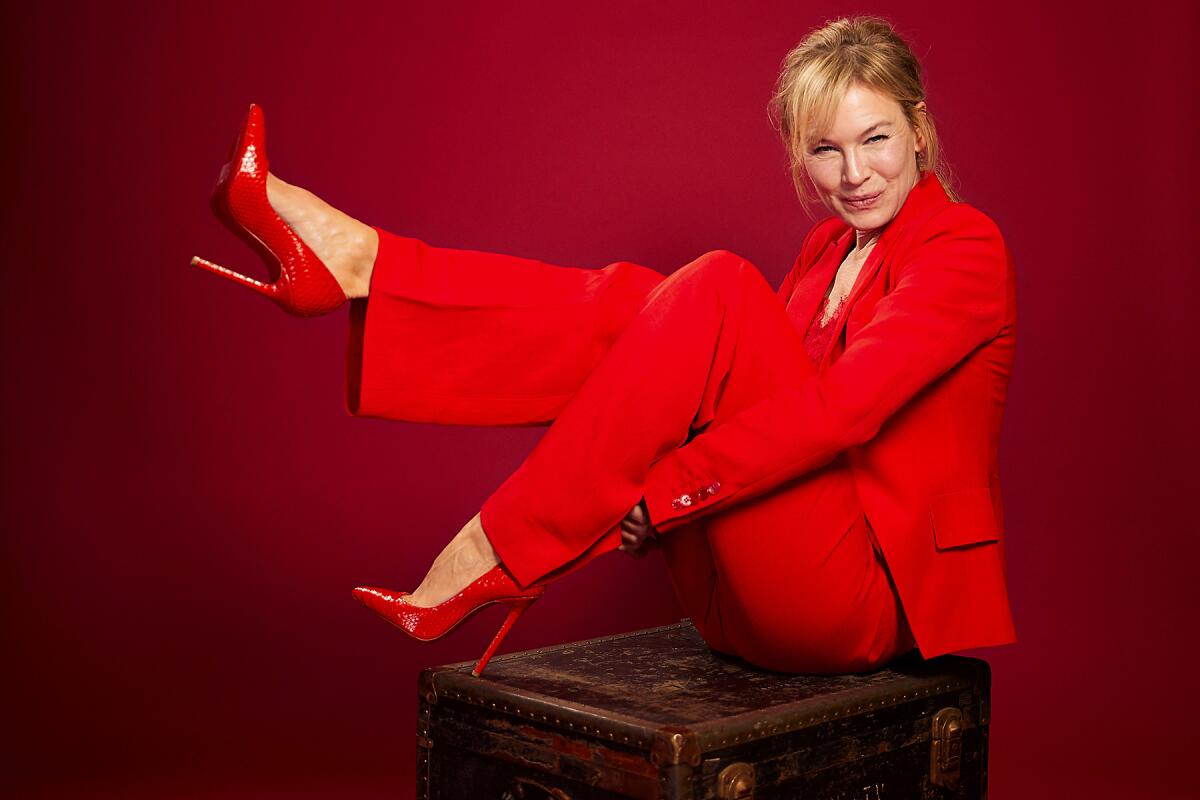
I’m wondering if in the last couple of years you all have noticed concrete changes on sets, like there’s been discussion about intimacy coordinators and sort of a different vibe, having more women around. Have you seen practical changes in that way?
Zellweger: It’s just that people are conscientious about it in a way that they hadn’t been before. Considering things, that someone uses the word “consideration,” that there’s consideration. Just things that people took for granted, that this is fine. You know, no one ever thought to question, “Oh wait, no, it’s really kind of not.”
Lopez: For “Hustlers,” it was an amazing thing to see all women on a set. All the producers, mostly women, and the ones that were on the set every day were women. The director was a woman. The writer was a woman. All the cast were women, the editor ... there were just women everywhere. And what you realize is like, “Wow, I’ve never been on a set where it was like that.” And I’ve done I don’t know how many movies in the past how many years.

Jennifer Lopez on the shock of pole dancing.
And they didn’t want to make the movie. A lot of people passed on it, on “Hustlers.” They were like, “Oh, you know, the guys have to be really bad if the women are drugging them.” If you’re looking at “Boogie Nights” in the porn industry or if you’re looking at “Goodfellas” and the Mafia, this is a story. The day-to-day life of an underground world. And this is what went on. And that’s the thing that’s worth telling. This is a certain type of person that is in a certain type of life. And we want to tell it with no judgment and just see if you like the story.
Erivo: “Harriet,” this particular script has taken 20 years. It was written 20 years ago now. And then Debra Martin Chase, the producer, got her hands on it about 10 years ago and it’s taken that long to get here because people just didn’t want to make movies where there was a woman of color at the center and in a period movie. It just wasn’t being made. And so it just was one of the most refreshing things to be doing that and still have emotional agency. And with my director, Kasi Lemmons, another woman of color, that’s never happened in my life. I think I’ve been directed by one woman in theater as well. So it’s one of those amazing things to be a part of, to see yourself on the other side of the camera as well.

Cynthia Erivo on fleshing out Harriet Tubman’s humanity.
Nora, as someone who is still relatively fresh in your career, do you find this moment, does it feel like one that’s full of possibility? Is it exciting for you to know that there’s all these opportunities working with female filmmakers, having new distribution platforms? That must make this a really exciting moment to be emerging as a performer.
Lum: It does. And I’ve always been very outspoken. I’m very optimistic about the direction that we’re going. But that’s also not to say that you don’t have to acknowledge where it’s changing from. To hear that a lot of actresses haven’t worked with a lot of women. I’ve worked with equal parts men and women. I’ve worked with female DPs, I’ve worked with female writers, all female writers rooms. So yes, it does seem like there is a lot of possibility, not just for me but for everyone. It seems like people want to hear our stories and different kinds of stories are being put on. But we have to realize what we’re changing from what other people had to go through before us.
Awkwafina is not herself. She’s also not her “The Farewell” writer-director, Lulu Wang.
So, Jennifer, you are very good at being a celebrity. It seems like something you are naturally good at and comfortable with. Is that something you’ve learned?
Theron: Tell us. Help us.
Lopez: I feel like there is a responsibility when you’re a public person. You can’t get around it. I know we all want to be like, “just want to be me” and I just want to do this and I just want to do that. And I don’t care what people say or think. But we have to because we care what people say. And so it’s just about being your best self. And I think that’s where I keep my mind. It’s like you think I’m a good celebrity because what I’m trying to do is put my best foot forward all the time and still be myself, still be authentic to who I am.
Theron: You’ve never lost that. And I want that. So when you’re tired, and it’s inappropriate. What do you do? What do you tell yourself? Because I think I’m just [a jerk].
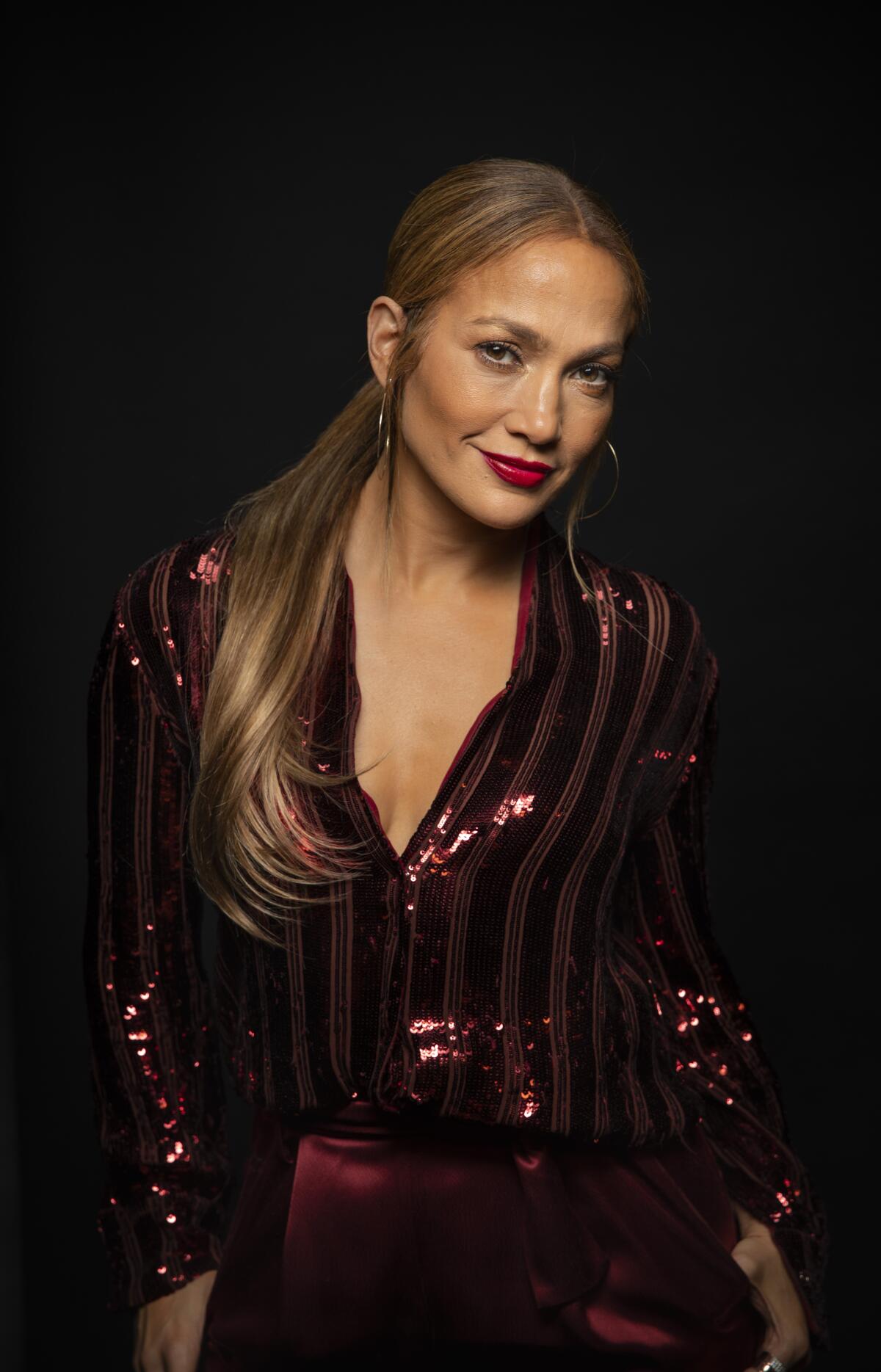
Lopez: I know exactly what you mean because I’m like that too. And I just try to stay super conscious of the fact that I have a responsibility and that maybe that person is never gonna meet me again. And it’s not that I don’t have bad days. I’m a human being. So I get tired. And people are constantly judging you.
I had terrible things happen in the beginning of my career that I had to come back from. I did magazine articles where I said the wrong thing. It was a trial-and-error thing. And then you get put in a category of like you’re this person or that person and you’re a diva. But at the same time, I had to look and go, what am I doing? Because at the end of the day, it’s always do you like what you’re doing. And for me, it’s always about how can I get better? That’s why I do so much. How can I be better? I’m going to be a better mom, sister, daughter, friend, business partner, a better actress, better singer, better dancer, better producer. It’s always about, how can we do it better next time? Because you make mistakes.
Renée, as Jennifer’s talking, I’m thinking that everyone here is on Instagram except you. Have you always been a little bit more private in that way?
Zellweger: I think about this a lot. And I think about the way that I grew up and the way that I was raised. My parents are very private people. And we didn’t talk about family things out in public. And I just feel uncomfortable with it. And I think our generation is probably the last to have some expectation of privacy. And so it’s a peculiar thing when it doesn’t occur to the younger generation that it’s not weird at all to pull out your phone and take a picture of somebody a foot from their face without saying hello, because that’s just the nature of things these days. And it’s perfectly normal. And I get that. I completely understand it. And I have no problem with it.
Renée Zellweger is making her way through a bowl of potato chips in the lobby of Casa del Mar, the beachfront Santa Monica hotel she used as an office for a couple of years while she was developing a television series, “Cinnamon Girl,” about four young women coming of age in Los Angeles in the late ’60s.
Cynthia, with a historical movie like “Harriet,” it’s hard not to want to connect it to the modern day and think of what are the things that we can maybe take from her story. For you, what are the things the story of Harriet Tubman has to say to a contemporary audience?
Erivo: It has a few things. I’ll start at Harriet. And that she’s small. She was 5 foot. I don’t think people realize how small she was. And she was uneducated. She didn’t have any reading and writing skills, but still managed to at one point save the money that she was earning from being hired out to different farms to hire a lawyer to draw up the papers for her mother’s freedom. So I think the thing to take away from her is that if you set your mind to being able to do something, you should probably be able to do it. The capacity to change the world is more in our reach than we think it is. It was very far out of her reach, but she managed to do it over and over and over and over again.
The second is to look at these moments in time as a warning. That was a terrible time, not just for grievous bodily harm, but for family separation, which is also violence in itself. And we’re watching it now, right? And we need to take heed when things like this happen, when movies like this come out, they need to just stand as a warning. It’s not a coincidence that it took 20 years and [we] have it actually happening today.
Awards Season
2019 Envelope Rounables
More to Read
Only good movies
Get the Indie Focus newsletter, Mark Olsen's weekly guide to the world of cinema.
You may occasionally receive promotional content from the Los Angeles Times.
